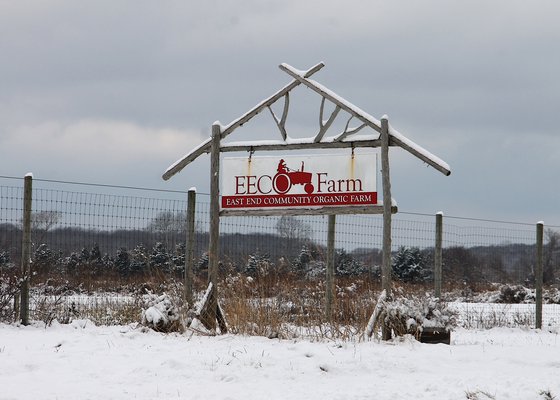
After years of rumors circulating about arsenic in East End soils, the verdict is in. Yes, there are elevated levels of arsenic in former farm fields. But no, it’s not as bad as it sounds.
Following ongoing public outcry, the Town of East Hampton invited the Cornell University Cooperative Extension of Suffolk County to test the soils at East End Community Organic (EECO) Farm in October. The 42 acres of town-owned land is leased out to local growers.
While some levels of arsenic are fine—it is a naturally occurring element in soil—arsenic-based pesticides were used extensively on Long Island to control agricultural pests between the 1940s and the 1960s. It was one of the few pesticides that were effective against the Colorado potato beetle, the Long Island variety of which is particularly bad.
“If left untreated, within a few days they can demolish a crop,” said Alex Balsam, a local farmer and a board member of EECO Farm. Mr. Balsam said that the beetle is “world-renowned” for its ability to become immune to chemical treatments.
Although arsenic-based pesticides have not been used for decades, the chemical composition of the metal causes it to bind tightly to the soil and stick to the surface layer for years. Poisoning from the substance causes abdominal pain, diarrhea, vomiting, dark urine, dehydration, vertigo, delirium, shock and death.
Although the soil at EECO Farm was tested in 2005 and 2011, concern continues to bubble up over the issue, with the chair of the East Hampton and Sag Harbor Citizens Advisory Committee recently telling The Independent that she would not eat any produce grown on EECO Farm land.
“The issue of arsenic in farm soils is something that has been out there for a few years,” Mr. Balsam said. The farmer feels that “having a not-science-based conversation” isn’t helpful for anyone, and is happy that Cornell tested the soils again.
The soil was tested at 12 separate spaces, including two vegetable samples. Samples at EECO Farm ranged from 10.6 to 33.1 mg/kg of arsenic concentration, with vegetable samples of peppers and squash having non-detectable levels. According to Cornell Cooperative Extension of Suffolk County’s report, New York State background levels range from 7 to 40 mg/kg.
“It is unfair to continuously bring up this topic and question food safety when scientific testing repeatedly shows improvement on the part of EECO Farm,” said Jessica Anson, the public policy director at Long Island Farm Bureau, in an email. “A crop would not survive in soils contaminated with excessive levels of arsenic.”
Although EECO Farm’s land was deemed safe for growing vegetables by the New York State Department of Health, the soil itself poses a threat if ingested or inhaled, especially to small children and pregnant women. In the report, Cornell recommends that EECO Farm post informational signs and establish turf cover in non-garden areas to limit exposure for visitors. It is also important for all vegetables grown in soil with arsenic levels to be washed.
“People have a right to know,” said Elaine Jones, a member of the East Hampton Town agricultural advisory committee. “The problem still exists, and that’s what I am afraid of, is that they will try to wash it under the rug.”
Ms. Jones, who has operated Vicki’s Veggies in Amagansett for more than 35 years, feels that it is a public health issue. Referencing a cancer cluster in East Hampton High School, Ms. Jones is concerned particularly about small children inhaling the dust at EECO Farm or eating the soil. She hopes to see signs put up.
“The taxpayers are the ones who will be sued if someone gets cancer,” Ms. Jones said. She has not yet tested her own land, which is used to grow vegetables for her stand, but plans on doing so in the future.
Cornell’s report commended the town for its work to bring down the levels of arsenic in the soil. Since 2005, average arsenic concentrations at EECO Farm fell from 40.6 mg/kg to 27.1 mg/kg.
“Organic matter is the best weapon” to bring arsenic levels down, Mr. Balsam said.
While using organic matter like compost and cover crops to bolster the soil has long been a practice of organic farms like the Green Thumb or Quail Hill, many traditional growers on Long Island have recently followed these soil-boosting practices. In addition to lowering potential arsenic levels, the addition of organic matter adds key nutrients to the soil.
Mr. Balsam said, “The science showed without question that the produce is safe, not [just] on EECO Farm but on any farm field on Long Island.”